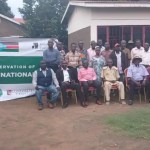(ABYEI) – Violet Nasambu Lusala, the outgoing Police Commissioner of the United Nations Interim Security Force for Abyei (UNISFA), has completed her four year term with a message of unity, gender inclusion and community focused policing. Her departure marks the end of a notable chapter in UNISFA’s history, especially in terms of engagement with the local population and the advancement of women in peacekeeping efforts that resonate with broader lessons for South Sudan and the region.
Commissioner Lusala described her time in Abyei as both humbling and transformative. Working in a region defined by cultural richness and complex challenges, she led a multinational UN Police (UNPOL) team tasked with maintaining peace in the absence of a functioning local police force. She emphasised how this unique environment helped shape both her personal and professional growth, citing deep cooperation with local communities and authorities as central to her experience.
One of her key achievements was establishing and operationalising Community Protection Committees (CPCs) and Joint Protection Committees (JPCs). These structures were critical in filling the gap left by the absence of a formal Abyei Police Service. The initiatives gave local residents a direct role in managing their own safety and allowed UNPOL to work more effectively on the ground. These committees also helped build trust between peacekeepers and communities, a relationship often difficult to forge in conflict-affected areas.
Lusala also celebrated a major milestone in gender parity. Under her leadership, the proportion of female UNPOL officers rose from 30% to 40%, surpassing international peacekeeping targets. She noted this progress as not only numerical but structural, with more women taking on leadership roles within UNPOL and through community projects aimed at female empowerment.
The commissioner did not downplay the challenges faced during her term. Abyei’s fragile political and security situation presented daily hurdles. Without an official local police institution, UNPOL had to be creative and flexible in its methods. Logistical difficulties, poor infrastructure and language barriers added to the pressure.
Yet, Lusala framed these challenges as opportunities for learning and collaboration. She credited teamwork between the military, civilian components, and community leaders for enabling UNISFA to meet its responsibilities in a practical and grounded way.
A consistent theme in her leadership was community engagement. Lusala emphasised listening, inclusivity and local ownership in policing. Gender sensitivity was embedded into their strategy through mentoring, outreach, and open dialogues with community members. She stressed that inclusion is not just a policy, but a duty in peacekeeping contexts.
As she prepared to leave, her message to the people of Abyei was one of gratitude. She acknowledged the community’s trust and openness, which made it possible for her team to carry out their work. She also offered praise to her colleagues across UNISFA, urging them to continue their mission with professionalism and compassion, noting that unity is key to the mission’s strength.
To young police officers, especially women interested in joining peacekeeping missions, Lusala offered words of encouragement. She urged them to believe in their abilities, maintain discipline and empathy, and aim for leadership despite systemic or societal barriers. She cited her own path as evidence that women can and do succeed in peacekeeping leadership.
With her UN role concluded, Lusala will return to Kenya to resume service with the Kenya National Police Service. She plans to apply the experience and broader perspective gained through international peacekeeping to support policing and leadership at home.


















































